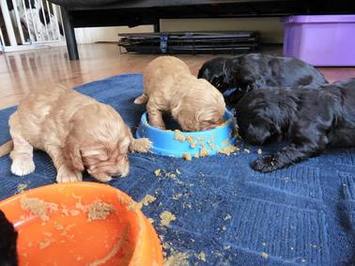HOW TO FIND A GOOD BREEDER?

As the popularity of Cockapoo's grows, and more and more people decide to breed them, it is important to recognise that not all will do so with the safety and welfare of the dogs and puppies in mind.
Unfortunately there are unscrupulous people who see it as a money making opportunity solely, and do not care about the living conditions or health of their dogs.
Here are some guidelines which we feel should be considered when looking for a good breeder, and which will hopefully reduce the chance of getting caught out by a puppy farm or uncaring breeder.
WHERE TO LOOK
It is important to do your research when you have decided to get a Cockapoo puppy. Starting off on your search can seem a bit daunting - it is a big responsibility after all, but there are some simple things to do to start you off.
Talking to other Cockapoo owners is a great way of finding out information and views, not only about the dogs but where they come from and whether a particular breeder offered a good service.
We have an active Facebook chat page where members chat, exchange stories and ask for advice.
Some Cockapoo forums and Clubs organise members walks - ask if you can go along and meet them even if you don't have a dog yet. There is nothing better than seeing a load of Cockapoo's running and playing together and it gives you the chance to find out which breeders people have used!
Search online for Cockapoo breeders websites but don't take them at face value. The breeder with the glitzy, smart looking webpage may not be all they seem, so read what they have to say but keep an open mind.
Look at pet advertising sites like Breeders Online for breeders in your area and if they have pups available.
REPUTATION
Look for a breeder with a good reputation.
Don't be fooled by a flashy website and just decide to go with that person - unfortunately there are some unscrupulous people out there and care has to be taken.
Have a word with other owners, your local vet, do a search online and join forums and clubs and ask on there too. You can never have too much information.
Decide if you want to go with a large scale, commercial breeder or a smaller scale one who just breeds the odd litter from home.
The legislation on dog breeding in England, Northern Ireland, Scotland and Wales varies slightly so please check on our Dog Breeding Legislation page.
When you think you have got a short-list of potential breeders, draw up a list of questions you want to ask -
Has the breeder done health tests on the parents and can they give you copies of any documentation to prove this?.
There are several disorders which can be passed on to puppies from their parents. DNA testing is available for most of these and information on them is available on our Health Testing page.
NO PUPPY SHOULD BE BOUGHT FROM UNTESTED PARENTS and we recommend puppies are only bought from parents who have been tested CLEAR for this disease.
Can the breeder give you proof of results?
Please read the information on our Health Testing page.
If the breeder says the sire and dam are Kennel Club Registered, can they show certificates to prove it?
This is for F1 puppies only. Not all Cocker Spaniels or Poodles have to be registered with the Kennel Club and it makes no difference to the quality of their puppies, however if a breeder is claiming that the pedigree parents are Champion stock and charging more for the pups because of that, proof should be available.
Did they breed the pups themselves?
Can you go and see the puppies with their Mum?
If they give excuses or say this isn't possible, walk away.
Does the Mum respond to her name and interact with the owner and pup?
If the pup and Mum seem estranged, or if the Mum doesn't seem interested in it that should raise alarm bells. The Mum should also recognise the person selling the pups, if it is a caring owner who spends time with the dogs, and respond to its name, allow affection etc.
At what age will leave their Mum?
Pups should stay with their Mum until at least 8 weeks of age.
What age is the Mum and how many litters has the Mum had?
The minimum age for the first litter should be 18 months and no bitch should have a litter on her first season.
Breeding should stop no later than 6 years, and no bitch should be bred 'back to back' (every season) but should be given time to recover from birthing.
We recommend that a bitch should have no more than one litter per year.
What happens to the breeding bitches when their breeding time is over?
Do the breeders keep them as family pets, rehome them (if so, how?), are they spayed before being rehomed?
A good breeder will be aware of their duty of care towards their breeding bitches and will make sure they are properly cared for after their breeding life is over.
Have the puppies been treated for fleas, wormed and vaccinated and is there paperwork with details?
Is the puppy microchipped and will you be given paperwork with details?
Are the puppies exposed to general household bustle at an early age, brought up in a home environment?
Is the place clean, do you get a good feeling about how their dogs are cared for?
Sometimes a gut instinct is worth listening to - if it doesn't 'feel' right, it may not be.
Does the breeder offer a contract and lifelong support?
Does the breeder provide a 'Puppy Pack'?
Many breeders will give new puppy owners a selection of goodies when they pick up their pup. Contents of a puppy pack could include -
Birth Certificate detailing names of parents, Grandparents
Microchip details
Vaccination certificate
Limited Pet Insurance
Puppy collar and lead
Blanket with scent of Mum and siblings on
Puppy food
Bowls
Go and see more than one breeder if you can and don't be offended if a breeder starts asking you questions too.
It is a good sign that they are being careful who is buying their pups and trying to make sure they go to a good home. If your breeder suggests you buy two pups, walk away! They do not have the welfare of their puppies at heart (see Litter mate Syndrome)
|
|
|

